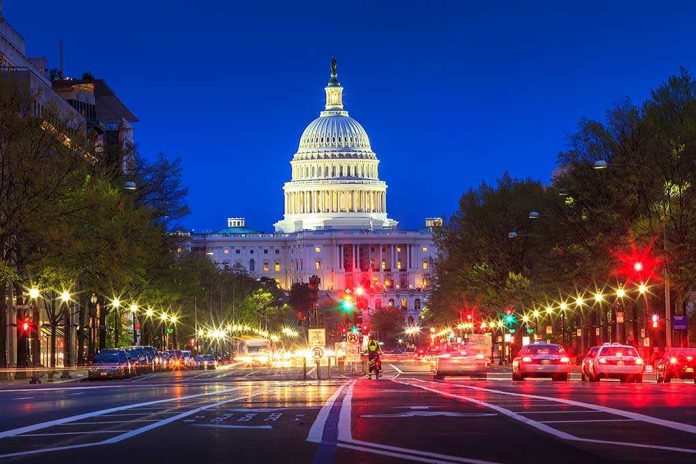
Trump’s $9.4 billion rescission package, targeting NPR, PBS, and foreign aid, has the Senate on edge and the left in meltdown—will common sense finally prevail in Washington, or will moderate Republicans buckle under pressure at the last minute?
At a Glance
- Senate is considering President Trump’s $9.4 billion rescissions package, slashing funds for NPR, PBS, and foreign aid.
- The Department of Government Efficiency (DOGE) identified the cuts, reflecting Trump’s push for fiscal discipline and ending taxpayer support for perceived liberal institutions.
- Passage hinges on a razor-thin GOP majority, with moderate Republican senators under intense pressure from both sides.
- Public broadcasting advocates warn of rural station closures and “information deserts,” while fiscal conservatives call the bill overdue.
Senate to Decide Fate of Public Broadcasting and Foreign Aid as Rescissions Package Moves Forward
The U.S. Senate is locked in high-stakes deliberations over President Trump’s $9.4 billion rescissions package, a sweeping effort to claw back funds from public broadcasting and foreign aid that has ignited partisan warfare on Capitol Hill. The Department of Government Efficiency (DOGE), brainchild of the Trump administration and once helmed by Elon Musk, meticulously identified the programs on the chopping block, with NPR and PBS topping the list. The House, under Speaker Mike Johnson, passed the bill in mid-June, framing the move as overdue fiscal responsibility and a long-awaited break from subsidizing what they label “radical, woke propaganda” in public media.
Senate Majority Leader John Thune now faces the unenviable task of corralling a party divided between staunch fiscal hawks like Sen. Rand Paul and moderates wary of alienating voters who actually rely on public broadcasting or see value in America’s overseas commitments. The outcome hangs on a handful of moderate Republicans; with the GOP’s thin majority, even three defections could tank the measure. The White House has made clear that a failure to deliver would be a political embarrassment, piling pressure on senators ahead of the vote.
Sharp Cuts Target NPR, PBS, and Foreign Aid—Public Broadcasting Feels the Heat
The bill, formally known as H.R.4 (Rescissions Act of 2025), would immediately eliminate all federal funding for NPR and PBS, a move that public broadcasting defenders warn could force stations to shut down in rural and low-income communities. The Corporation for Public Broadcasting (CPB), which operates as the funding conduit, has sounded the alarm about the impact on educational programming, children’s shows, and local news. Democrats, meanwhile, are making the usual arguments about “cultural and educational value”—as if that justifies a never-ending taxpayer subsidy for institutions that seem allergic to representing the values of half the country.
Foreign aid is also on the chopping block, with significant reductions to global health, refugee support, and climate programs. Policy analysts argue America’s diplomatic muscle and global influence could suffer, but fiscal conservatives counter that these programs are ripe for trimming, especially with inflation and debt spiraling out of control. The irony is rich: only in Washington could sending billions abroad while Americans can’t afford groceries be considered “responsible governance.”
Political Fallout and the Ideological Divide
Speaker Johnson and other House Republicans have not minced words: funding for public broadcasting is a relic, and the left-wing bias of NPR and PBS has no place on the taxpayer’s dime. The Department of Government Efficiency’s findings gave Republicans the ammunition they needed to finally take a scalpel—and maybe a chainsaw—to the sacred cows of liberal media and international handouts. Yet, the political risks are real. Moderate Republicans up for reelection in swing states fear backlash from constituents who depend on public broadcasting, particularly in rural areas where alternatives are limited. The left, of course, is already prepping attack ads about “information deserts” and “cultural devastation.”
Senate Republicans are reportedly considering amendments to soften the blow, especially on foreign aid, but even a watered-down rescission would mark a dramatic shift from the tax-and-spend status quo. The White House has dangled the possibility of executive action to claw back funds if Congress fails to act, but legal experts doubt that route could survive a court challenge. For now, all eyes are on the Senate floor, where the next few days will determine whether Washington finally gets serious about spending—or whether the swamp swallows yet another attempt at reform.
Expert Perspectives and the Broader Impact
Industry experts and academics agree on at least one thing: the stakes are enormous. Policy analysts warn that pulling the plug on public broadcasting would disproportionately hurt rural communities, widening the information gap and slashing educational resources for children. Foreign policy experts caution that cutting international aid could erode American influence and undermine strategic interests. On the other hand, fiscal conservatives and a growing number of everyday Americans see the rescission as a long-overdue correction to decades of government overreach and misplaced priorities. The debate underscores a deeper ideological divide: should government play nanny to public media and the world at large, or should it focus on serving American taxpayers first?
Whatever the outcome, the fight over Trump’s rescissions package is a defining moment for the 119th Congress—and a litmus test for whether the post-Biden era will deliver on its promise of restoring sanity to Washington’s spending habits. If the bill passes, expect a domino effect: more scrutiny of government sacred cows, more pressure to end handouts, and maybe, just maybe, a return to something resembling fiscal common sense. If it fails, brace for another round of finger-pointing as the swamp proves—once again—that it takes more than a new president to drain it.









